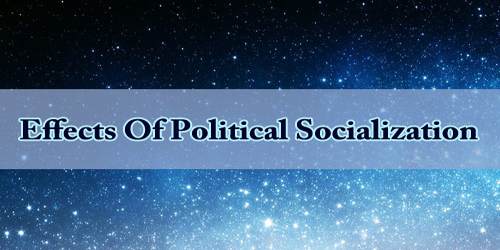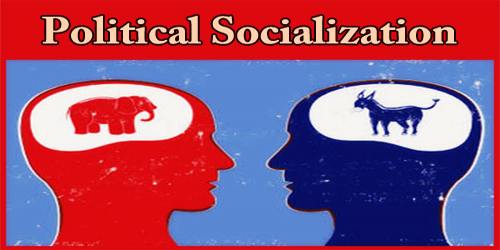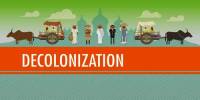In the fields of the political sciences, ‘Political Socialization’ is the process through which a person develops political beliefs and opinions that influence their behavior in social spheres. Socialization is largely a one-way process through which young people gain an understanding of the political world through their interaction with adults and the media. Actually, Political socialization is the “process by which individuals learn and frequently internalize a political lens framing their perceptions of how power is arranged and how the world around them is (and should be) organized; those perceptions, in turn, shape and define individuals’ definitions of who they are and how they should behave in the political and economic institutions in which they live.”
Political socialization also encompasses the way in which people acquire values and opinions that shape their political stance and ideology: it is a “study of the developmental processes by which people of all ages and adolescents acquire political cognition, attitudes, and behaviors.” It refers to a learning process by which norms and behaviors acceptable to a well-running political system are transmitted from one generation to another. It is through the performance of this function that individuals are inducted into the political culture and their orientations towards political objects are formed. Schools, media, and the state have a major influence in this process.
Political scientists Gabriel Almond and James Coleman once observed that we “do not inherit our political behavior, attitudes, values, and knowledge through our genes.”Gabriel A. Almond and James S. Coleman, eds., The Politics of the Developing Areas (Princeton, NJ: Princeton University Press, 1960), 27. Instead, we come to understand our role and to “fit in” to our political culture through the political learning process. Pamela Johnston Conover, “Political Socialization: Where’s the Politics?” in Political Science: Looking to the Future, Volume III, Political Behavior, ed. William Crotty (Evanston, IL: Northwestern University Press, 1991). Political learning is a broad concept that encompasses both the active and passive and the formal and informal ways in which people mature politically. Carole L. Hahn, Becoming Political (Albany: State University of New York Press, 1998). Individuals develop a political self, a sense of personal identification with the political world. Developing a political self begins when children start to feel that they are part of a political community. They acquire the knowledge, beliefs, and values that help them comprehend government and politics.
Political socialization effects –
Political socialization begins in childhood. Some research suggests that family and school teachers are the most influential factors in socializing children, but recent research designs have more accurately estimated the high influence of the media in the process of political socialization. On average, both young children and teenagers in the United States spend more time a week consuming television and digital media than they spend in school. Young children consume an average of thirty-one hours a week, while teenagers consume forty-eight hours of media a week. High school students attribute the information that forms their opinions and attitudes about race, war, economics, and patriotism to mass media much more than their friends, family, or teachers. Research has also shown that children who consume more media than others show greater support for and understanding of American values, such as free speech. This may be because eighty percent of the media content children consume is intended for an adult audience. In addition, the impact of the messages is more powerful because children’s brains are “prime for learning”, thus more likely to take messages and representations of the world at face value.
In research into the effects of political socialization, an answer is sought to the question: what political knowledge, opinions, skills, attitudes, behavioral intentions and behavioral patterns do individuals have at a given point in time?
A relatively small number of researchers have charted the political knowledge, and so forth of youngsters. The following picture has emerged with respect to young people in the Netherlands. They have very limited knowledge of political structures and processes at the national level. Their knowledge of provincial and local politics is even more limited. Knowledge of international political structures fares somewhat better (with the exception of European Community political structures). Many of them display a tendency to personalize politics and to rely exclusively on psychological explanations to explain political phenomena. There is very little interest within this group for national parliamentary politics. The interest in international politics is somewhat greater. There is yet more interest in the content of certain political problems (disarmament for example). A large number of young people are critical of society as it is now; they think more progressively than adults about many problems. When asked which party they would vote for if there were elections, one-third of the youthful citizens questioned said that they did not yet know, or did not want to say. Confessional parties are not particularly popular among young people.
One-third of this group of young people has a mediocre or poor level of political efficacy. About half of them are politically cynical. Two-thirds are suspicious of politics. Information about political topics reaches very few young people via radio and television. Young people likewise learn very little about political topics from newspapers. Although they do usually read a newspaper (generally only one, and a local one at that), they usually begin with local news; the list of preferred reading then proceeds from a rough scanning of the newspaper as a whole to current events, then the ‘human interest’ or ‘show’ page and the advertisements, then the sports page, the sensational items like disasters, accidents and crime, and only then the political news. The financial and cultural news are at the end of the list. Young people read virtually no weekly news magazines. In general, young people do not take advantage of their right to vote. When they are asked why not, they say most often: “I don’t know enough about it”. Extremely few young people are active in political processes (such as political campaigns and activities of political youth organizations).
It should be noted that investigations among young people (in the Netherlands) of political knowledge, skills, and so forth have until now been considerably fragmented (different researchers, a different formulation of central research problems, different research instruments, different populations being studied). An important step would be for the investigations themselves to be investigated with respect to validity, reliability, and relevance. It should be sought out whether the knowledge and so forth being investigated is as relevant as possible within the context of the competencies required for voting in elections and taking part in other important political processes.
There are different patterns in socialization based on race, ethnicity, gender, age, income, education, geographic region, and city size. For example, generally, African Americans and Hispanics rely on television for their information more than white people. More women than men watch daytime television, and more men than women follow sports programs. Older people read more newspapers than younger people, and people from the ages of twelve to seventeen (although they consume the most media) consume the least amount of news. Northerners listen to radio programs more than Southerners do. News outlets on the East Coast tend to cover international affairs in Europe and the Middle East the most, while West Coast news outlets are more likely to cover Asian affairs; this demonstrates that region affects patterns in media socialization. Income level is also an important factor; high-income families rely more on print media than television and consume less television than most of the population.
Ultimately, however, the common core of information, and the interpretation the media applies to it, leads to shared knowledge and basic values throughout the United States. Most media entertainment and information does not vary much throughout the country, and it is consumed by all types of audiences. Although there are still disagreements and different political beliefs and party affiliations, generally there are not huge ideological disparities among the population because the media helps create a broad consensus on basic US democratic principles.
Information Sources:
















